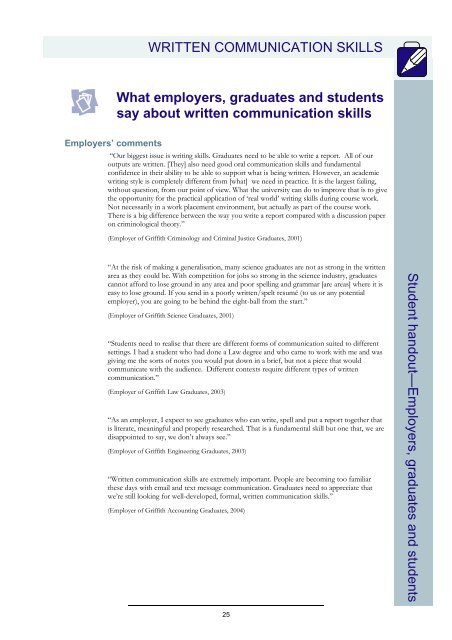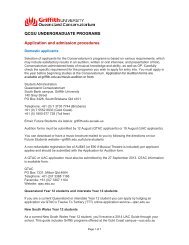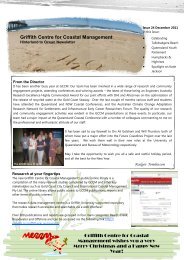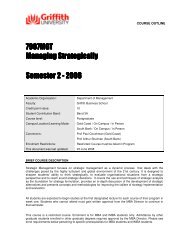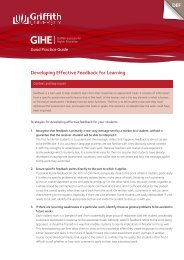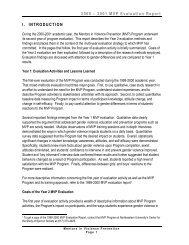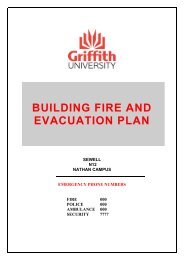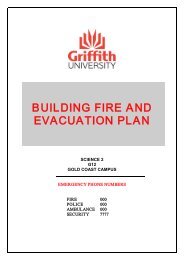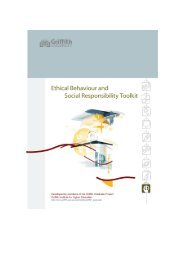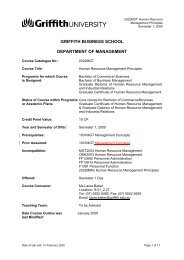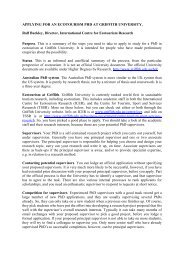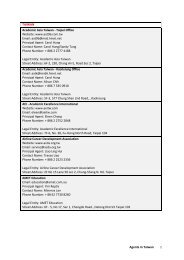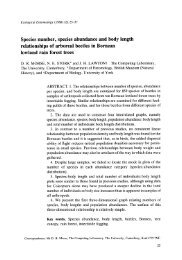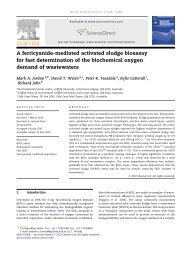Purpose of this Toolkit - Griffith University
Purpose of this Toolkit - Griffith University
Purpose of this Toolkit - Griffith University
You also want an ePaper? Increase the reach of your titles
YUMPU automatically turns print PDFs into web optimized ePapers that Google loves.
WRITTEN COMMUNICATION SKILLS<br />
What employers, graduates and students<br />
say about written communication skills<br />
Employers’ comments<br />
“Our biggest issue is writing skills. Graduates need to be able to write a report. All <strong>of</strong> our<br />
outputs are written. [They] also need good oral communication skills and fundamental<br />
confidence in their ability to be able to support what is being written. However, an academic<br />
writing style is completely different from [what] we need in practice. It is the largest failing,<br />
without question, from our point <strong>of</strong> view. What the university can do to improve that is to give<br />
the opportunity for the practical application <strong>of</strong> ‘real world’ writing skills during course work.<br />
Not necessarily in a work placement environment, but actually as part <strong>of</strong> the course work.<br />
There is a big difference between the way you write a report compared with a discussion paper<br />
on criminological theory.”<br />
(Employer <strong>of</strong> <strong>Griffith</strong> Criminology and Criminal Justice Graduates, 2001)<br />
“At the risk <strong>of</strong> making a generalisation, many science graduates are not as strong in the written<br />
area as they could be. With competition for jobs so strong in the science industry, graduates<br />
cannot afford to lose ground in any area and poor spelling and grammar [are areas] where it is<br />
easy to lose ground. If you send in a poorly written/spelt resumé (to us or any potential<br />
employer), you are going to be behind the eight-ball from the start.”<br />
(Employer <strong>of</strong> <strong>Griffith</strong> Science Graduates, 2001)<br />
“Students need to realise that there are different forms <strong>of</strong> communication suited to different<br />
settings. I had a student who had done a Law degree and who came to work with me and was<br />
giving me the sorts <strong>of</strong> notes you would put down in a brief, but not a piece that would<br />
communicate with the audience. Different contexts require different types <strong>of</strong> written<br />
communication.”<br />
(Employer <strong>of</strong> <strong>Griffith</strong> Law Graduates, 2003)<br />
“As an employer, I expect to see graduates who can write, spell and put a report together that<br />
is literate, meaningful and properly researched. That is a fundamental skill but one that, we are<br />
disappointed to say, we don’t always see.”<br />
(Employer <strong>of</strong> <strong>Griffith</strong> Engineering Graduates, 2003)<br />
“Written communication skills are extremely important. People are becoming too familiar<br />
these days with email and text message communication. Graduates need to appreciate that<br />
we’re still looking for well-developed, formal, written communication skills.”<br />
(Employer <strong>of</strong> <strong>Griffith</strong> Accounting Graduates, 2004)<br />
Student handout—Employers, graduates and students<br />
25


